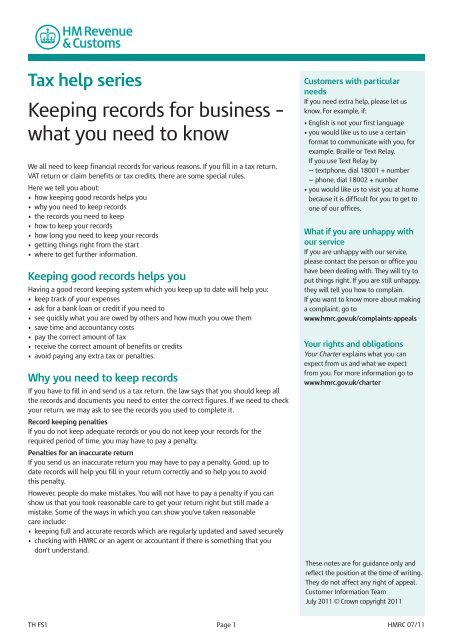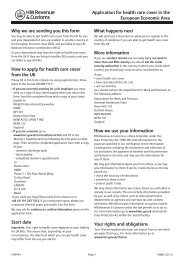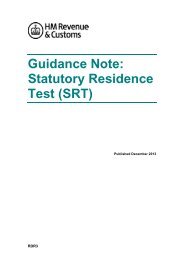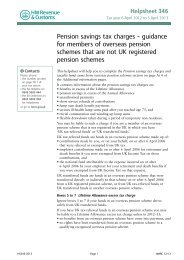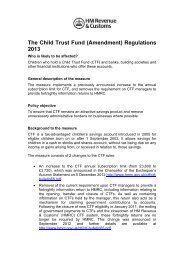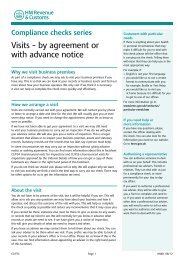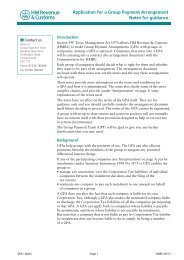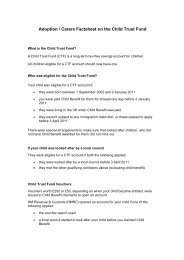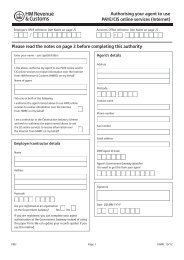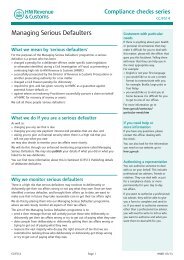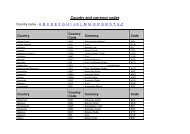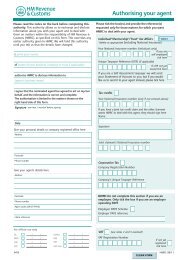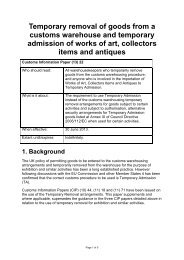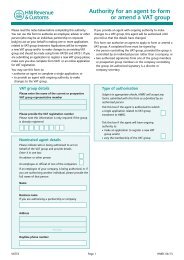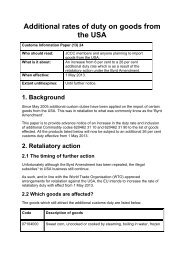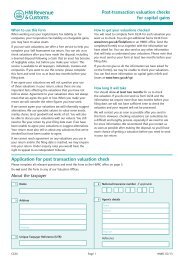Tax help series Keeping records for business - HM Revenue ...
Tax help series Keeping records for business - HM Revenue ...
Tax help series Keeping records for business - HM Revenue ...
Create successful ePaper yourself
Turn your PDF publications into a flip-book with our unique Google optimized e-Paper software.
<strong>Tax</strong> <strong>help</strong> <strong>series</strong><br />
<strong>Keeping</strong> <strong>records</strong> <strong>for</strong> <strong>business</strong> –<br />
what you need to know<br />
We all need to keep financial <strong>records</strong> <strong>for</strong> various reasons. If you fill in a tax return,<br />
VAT return or claim benefits or tax credits, there are some special rules.<br />
Here we tell you about:<br />
• how keeping good <strong>records</strong> <strong>help</strong>s you<br />
• why you need to keep <strong>records</strong><br />
• the <strong>records</strong> you need to keep<br />
• how to keep your <strong>records</strong><br />
• how long you need to keep your <strong>records</strong><br />
• getting things right from the start<br />
• where to get further in<strong>for</strong>mation.<br />
<strong>Keeping</strong> good <strong>records</strong> <strong>help</strong>s you<br />
Having a good record keeping system which you keep up to date will <strong>help</strong> you:<br />
• keep track of your expenses<br />
• ask <strong>for</strong> a bank loan or credit if you need to<br />
• see quickly what you are owed by others and how much you owe them<br />
• save time and accountancy costs<br />
• pay the correct amount of tax<br />
• receive the correct amount of benefits or credits<br />
• avoid paying any extra tax or penalties.<br />
Why you need to keep <strong>records</strong><br />
If you have to fill in and send us a tax return, the law says that you should keep all<br />
the <strong>records</strong> and documents you need to enter the correct figures. If we need to check<br />
your return, we may ask to see the <strong>records</strong> you used to complete it.<br />
Record keeping penalties<br />
If you do not keep adequate <strong>records</strong> or you do not keep your <strong>records</strong> <strong>for</strong> the<br />
required period of time, you may have to pay a penalty.<br />
Penalties <strong>for</strong> an inaccurate return<br />
If you send us an inaccurate return you may have to pay a penalty. Good, up to<br />
date <strong>records</strong> will <strong>help</strong> you fill in your return correctly and so <strong>help</strong> you to avoid<br />
this penalty.<br />
However, people do make mistakes. You will not have to pay a penalty if you can<br />
show us that you took reasonable care to get your return right but still made a<br />
mistake. Some of the ways in which you can show you’ve taken reasonable<br />
care include:<br />
• keeping full and accurate <strong>records</strong> which are regularly updated and saved securely<br />
• checking with <strong>HM</strong>RC or an agent or accountant if there is something that you<br />
don’t understand.<br />
<strong>Tax</strong> <strong>help</strong> <strong>series</strong><br />
Customers with particular<br />
needs<br />
If you need extra <strong>help</strong>, please let us<br />
know. For example, if:<br />
• English is not your first language<br />
• you would like us to use a certain<br />
<strong>for</strong>mat to communicate with you, <strong>for</strong><br />
example, Braille or Text Relay.<br />
If you use Text Relay by<br />
— textphone, dial 18001 + number<br />
— phone, dial 18002 + number<br />
• you would like us to visit you at home<br />
because it is difficult <strong>for</strong> you to get to<br />
one of our offices.<br />
What if you are unhappy with<br />
our service<br />
If you are unhappy with our service,<br />
please contact the person or office you<br />
have been dealing with. They will try to<br />
put things right. If you are still unhappy,<br />
they will tell you how to complain.<br />
If you want to know more about making<br />
a complaint, go to<br />
www.hmrc.gov.uk/complaints-appeals<br />
Your rights and obligations<br />
Your Charter explains what you can<br />
expect from us and what we expect<br />
from you. For more in<strong>for</strong>mation go to<br />
www.hmrc.gov.uk/charter<br />
These notes are <strong>for</strong> guidance only and<br />
reflect the position at the time of writing.<br />
They do not affect any right of appeal.<br />
Customer In<strong>for</strong>mation Team<br />
July 2011 © Crown copyright 2011<br />
TH FS1 Page 1 <strong>HM</strong>RC 07/11
The <strong>records</strong> you need to keep<br />
The sort of <strong>records</strong> you need to keep depends upon the type of tax you have to pay.<br />
To find out what <strong>records</strong> you should be keeping, use the interactive tool at<br />
www.<strong>business</strong>link.gov.uk/recordkeepingcheck<br />
At the end of this factsheet there are tables which give examples of the most<br />
common <strong>records</strong>.<br />
How to keep your <strong>records</strong><br />
The law does not say how you must keep your <strong>records</strong>. You must keep some original<br />
documents which show that tax has been deducted. An example is <strong>for</strong>m P60<br />
(end of year certificate <strong>for</strong> PAYE). We recommend that you keep all original<br />
documents you receive.<br />
Most <strong>records</strong> can be kept electronically (on a computer or any storage device such<br />
as disk, CD, memory stick or microfilm) as long as the method you use:<br />
• captures all the in<strong>for</strong>mation on the document (front and back) and<br />
• allows the in<strong>for</strong>mation to be presented to us in a readable <strong>for</strong>mat, if we need to<br />
see it.<br />
How long to keep your <strong>records</strong><br />
As a general rule, you should keep your <strong>records</strong> <strong>for</strong> a minimum of six years. However,<br />
if you are:<br />
• an employer, you need to keep Pay As You Earn (PAYE) <strong>records</strong> <strong>for</strong> 3 years<br />
(in addition to your current year)<br />
• a contractor in the Construction Industry Scheme (CIS), you need to keep your CIS<br />
<strong>records</strong> <strong>for</strong> 3 years (in addition to your current year)<br />
• keeping <strong>records</strong> to complete a personal (non <strong>business</strong>) tax return, you only need to<br />
keep them <strong>for</strong> 22 months from the end of the tax year to which they relate.<br />
If you need to keep <strong>records</strong> <strong>for</strong> other reasons, <strong>for</strong> example the Companies’ Act<br />
requires limited companies to keep specific <strong>records</strong> and you also use those <strong>records</strong><br />
<strong>for</strong> tax purposes, you need to be aware that there may be different time limits <strong>for</strong><br />
retaining them. Be careful not to destroy any <strong>records</strong> you also use <strong>for</strong> tax purposes<br />
too soon.<br />
Right from the start<br />
It is especially important if you are starting a new <strong>business</strong> that you get a proper<br />
record keeping system in place from the beginning.<br />
For in<strong>for</strong>mation about setting up in <strong>business</strong>, including a video about record keeping,<br />
go to www.<strong>business</strong>link.gov.uk/tax<strong>help</strong><br />
For a guide to <strong>help</strong> you to set up a record keeping system, go to<br />
www.<strong>business</strong>link.gov.uk/startrecordkeeping<br />
To find out what <strong>records</strong> you need to keep, go to<br />
www.<strong>business</strong>link.gov.uk/recordkeepingcheck<br />
Page 2<br />
Go to our website <strong>for</strong> a<br />
list of <strong>records</strong> that you<br />
need to keep<br />
Benefits and expenses<br />
www.hmrc.gov.uk/paye/exb/<br />
overview/recordkeeping.htm<br />
Capital Gains <strong>Tax</strong><br />
www.hmrc.gov.uk/cgt/intro/<br />
record-keeping.htm<br />
Construction Industry<br />
Scheme (CIS)<br />
www.hmrc.gov.uk/cis/returns/<br />
returns-<strong>records</strong>.htm<br />
Corporation <strong>Tax</strong><br />
www.hmrc.gov.uk/ct/managing/<br />
record-keeping.htm<br />
Money Laundering Regulations<br />
www.hmrc.gov.uk/mlr/problemschecks/visits.htm<br />
Partnerships<br />
www.hmrc.gov.uk/sa/rec-keep-partpartners.htm<br />
PAYE<br />
www.hmrc.gov.uk/paye/payroll/<br />
day-to-day/<strong>records</strong>.htm<br />
Self assessment – individuals<br />
and directors<br />
www.hmrc.gov.uk/sa/recordkeeping.htm<br />
Self-employed<br />
www.hmrc.gov.uk/sa/<br />
rec-keep-self-emp.htm<br />
Trustees<br />
www.hmrc.gov.uk/trusts/trustee/<br />
record-keeping.htm<br />
VAT<br />
www.hmrc.gov.uk/vat/managing/<br />
returns-accounts/accounts.htm
The <strong>records</strong> that you need to keep and further advice<br />
The <strong>records</strong> you need to keep will depend on the size and complexity of your <strong>business</strong> and the different taxes that you have to<br />
pay, collect or charge. These tables show the most commonly required <strong>records</strong> and documents. If the law requires you to keep<br />
specific <strong>records</strong>, this is highlighted in the table below.<br />
For more detailed in<strong>for</strong>mation, please refer to the <strong>HM</strong>RC website addresses <strong>for</strong> specific taxes listed in the right hand column, or<br />
go to ‘A general guide to keeping <strong>records</strong> <strong>for</strong> your tax return’ at www.hmrc.gov.uk/sa/rk-bk1.pdf<br />
Self-employed and partnerships<br />
Form or record Why Further in<strong>for</strong>mation<br />
A record of all sales and takings,<br />
including cash receipts.<br />
For example<br />
• till rolls<br />
• sales invoices<br />
• bank statements<br />
• paying-in slips<br />
• accounting <strong>records</strong>.<br />
A record of all purchases and<br />
expenses, including cash purchases.<br />
For example:<br />
• receipts<br />
• purchase invoices<br />
• bank and credit card statements<br />
• cheque book stubs<br />
• motoring expenses and mileage<br />
<strong>records</strong><br />
• accounting <strong>records</strong>.<br />
Construction Industry Scheme (CIS) All these are required by law<br />
Form or record Why Further in<strong>for</strong>mation<br />
Contractor<br />
Details of all payments made to all<br />
subcontractors <strong>for</strong> work done and<br />
materials subcontractors have<br />
purchased. For example,<br />
subcontractor invoices.<br />
Subcontractor<br />
Details of all payment and deduction<br />
statements. For example, copies of<br />
invoices issued and payment<br />
statements received.<br />
Allows you to quickly see what you are<br />
owed and accurately work out your<br />
total income.<br />
Allows you to quickly see what you<br />
have spent, how much you owe and<br />
what you can claim <strong>for</strong> tax purposes.<br />
To work out the right amount of CIS<br />
deductions that you need to make<br />
and pay.<br />
To fill in your monthly CIS returns<br />
accurately.<br />
Page 3<br />
Self-employed: go to<br />
www.hmrc.gov.uk/sa/<br />
rec-keep-self-emp.htm<br />
Additional <strong>records</strong> if your <strong>business</strong> is VAT registered All these are required by law<br />
• VAT account.<br />
• VAT sales and purchase invoices.<br />
• Import and export documentation,<br />
<strong>for</strong> example, delivery notes.<br />
This summary of your allowable VAT<br />
inputs and outputs <strong>help</strong>s you<br />
complete your VAT returns accurately.<br />
Partnerships: go to<br />
www.hmrc.gov.uk/sa/<br />
rec-keep-part-partners.htm<br />
Phone Self Assessment Helpline<br />
0845 900 0444<br />
VAT: go to<br />
www.hmrc.gov.uk/vat/managing/<br />
returns-accounts/accounts.htm<br />
Phone VAT Helpline<br />
0845 010 9000<br />
Construction Industry Scheme (CIS):<br />
go to www.hmrc.gov.uk/cis/<br />
returns/returns-<strong>records</strong>.htm<br />
Phone CIS Helpline<br />
0845 366 7899
Records you need to keep continued<br />
Limited companies<br />
Form or record Why Further in<strong>for</strong>mation<br />
Accounting <strong>records</strong> (including details<br />
of assets, liabilities, income &<br />
expenditure).<br />
Business <strong>records</strong> (bank statements and<br />
paying-in slips, accounts books,<br />
purchases and sales in<strong>for</strong>mation).<br />
To show the financial position at<br />
any time and comply with the<br />
Companies Act.<br />
To work out the amount of<br />
Corporation <strong>Tax</strong> that you need to pay,<br />
or claim back from us. To file an<br />
accurate Company <strong>Tax</strong> Return.<br />
Additional <strong>records</strong> if your <strong>business</strong> is VAT registered All these are required by law<br />
• VAT account.<br />
• VAT sales and purchase invoices.<br />
• Import and export documentation,<br />
<strong>for</strong> example delivery notes.<br />
Employer All these are required by law<br />
This summary of your allowable<br />
VAT inputs and outputs <strong>help</strong>s you<br />
complete your VAT returns accurately.<br />
Page 4<br />
Corporation <strong>Tax</strong>: go to<br />
www.hmrc.gov.uk/ct/managing/<br />
record-keeping.htm<br />
VAT: go to<br />
www.hmrc.gov.uk/vat/managing/<br />
returns-accounts/accounts.htm<br />
Phone VAT Helpline<br />
0845 010 9000<br />
Form or record Why Further in<strong>for</strong>mation<br />
All PAYE <strong>records</strong>. For example:<br />
• payments made to employees<br />
• deductions from your employee<br />
wages of Income <strong>Tax</strong>, National<br />
Insurance contributions (NICs)<br />
and Student Loan payments<br />
• details of employee benefits<br />
and expenses<br />
• all <strong>records</strong> of statutory<br />
payments (including sick pay<br />
and maternity pay).<br />
To work out the right amount of PAYE<br />
and NICs that you and your employees<br />
need to pay.<br />
To complete your annual PAYE Return<br />
accurately.<br />
To show that your employees are<br />
getting any statutory pay they're<br />
entitled to.<br />
PAYE: go to<br />
www.hmrc.gov.uk/paye/payroll/<br />
day-to-day/<strong>records</strong>.htm<br />
Benefits and expenses: go to<br />
www.hmrc.gov.uk/paye/exb/<br />
overview/recordkeeping.htm<br />
Phone Employer Helpline<br />
08457 143 143


